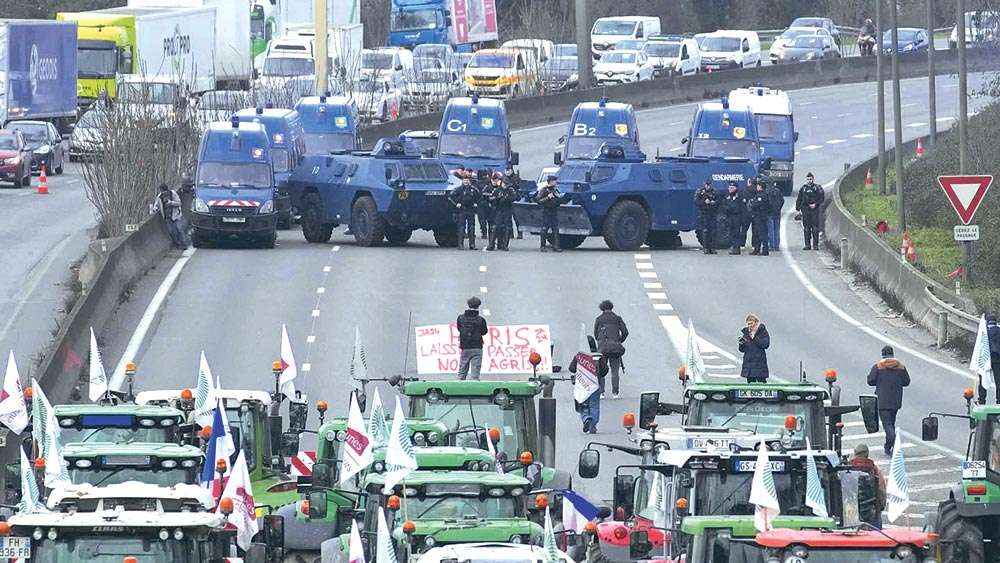|
Getting your Trinity Audio player ready...
|

- The recent wave of farmer protests in Europe is a symptom of deeper structural issues within the agricultural sector.
- Addressing these issues requires a comprehensive approach that prioritizes the interests of small-scale farmers, promotes environmental stewardship, and fosters collaboration among stakeholders.
- As Europe grapples with the complexities of its agricultural challenges, there is a growing consensus that comprehensive reform is needed.
In recent times, Europe has witnessed a surge in farmer protests, captivating attention and sparking debates about the state of agriculture in the region. These protests, marked by tractor blockades, road closures, and public demonstrations, are symptomatic of deeper issues plaguing agricultural communities across the continent. While the surface grievances often revolve around demands for better recognition, fair compensation, and improved working conditions, delving beneath the surface unveils a multifaceted landscape of challenges, complexities, and competing interests. At the heart of farmers’ discontent lies the issue of financial inequality.
Despite the European Union’s substantial financial support for agriculture, with a staggering €386.7 billion earmarked for the farming sector between 2021 and 2027, dissatisfaction persists. The crux of the matter lies in the distribution of subsidies, which disproportionately favour large-scale agribusinesses over smaller, family-owned farms. This disparity exacerbates existing inequalities within the agricultural sector, contributing to a sense of marginalization and injustice among smaller farmers.
The protests have also become a battleground for political interests, with conservative and far-right factions seizing upon the unrest to advance their agendas. These groups often scapegoat environmental regulations, portraying them as burdensome constraints on agricultural practices and economic growth. However, this oversimplified narrative overlooks the critical role of environmental stewardship in ensuring the long-term sustainability of agriculture. Sustainable farming practices are not only essential for preserving natural resources and mitigating climate change but also for safeguarding the livelihoods of future generations of farmers.
A central focus of the protests is the European Union’s Common Agricultural Policy (CAP), designed to support farmers and promote agricultural development. However, critics argue that CAP has failed to address the needs of small-scale farmers, leading to the decline of family-owned farms across Europe. Between 2005 and 2020, the number of farms in the EU decreased by almost 40%, disproportionately affecting smaller operations. This trend underscores the urgent need to reassess CAP’s effectiveness and prioritize the interests of small-scale farmers in policy-making processes.
Amidst the protests and political manoeuvring, there is a growing recognition of the need to prioritize environmental stewardship and promote sustainable agriculture. Biodiversity loss, soil degradation, and climate change pose significant threats to agricultural productivity and food security. Farmers themselves are increasingly recognizing the importance of adopting sustainable practices to mitigate these risks and ensure the long-term viability of their livelihoods.
As Europe grapples with the complexities of its agricultural challenges, there is a growing consensus that comprehensive reform is needed. This reform must address not only the immediate grievances of farmers but also the systemic issues that underlie them. It requires collaboration and dialogue among stakeholders, including farmers, policymakers, environmentalists, and consumers, to develop holistic solutions that balance economic prosperity with environmental sustainability.
In conclusion, the recent wave of farmer protests in Europe is a symptom of deeper structural issues within the agricultural sector. Addressing these issues requires a comprehensive approach that prioritizes the interests of small-scale farmers, promotes environmental stewardship, and fosters collaboration among stakeholders. By embracing these principles, Europe can chart a path towards a more equitable, resilient, and sustainable agricultural future.
References:
- Why are Farmers Protesting Across the EU: https://www.theguardian.com/environment/2024/feb/02/why-are-farmers-protesting-across-the-eu-and-what-can-the-bloc-do-about-it
- Farmers Protests Have Sprung Up Across Europe: https://www.euronews.com/2024/02/03/farmers-protests-have-sprung-up-across-europe-even-as-some-cease
- European Farmers Protest Change Speed But Discontent Continues: https://www.euractiv.com/section/agriculture-food/news/european-farmers-protest-change-speed-but-discontent-continues-smouldering/
Aayush Pal is a freelance writer on contemporary geopolitical developments. The views expressed in his work are entirely his own.
